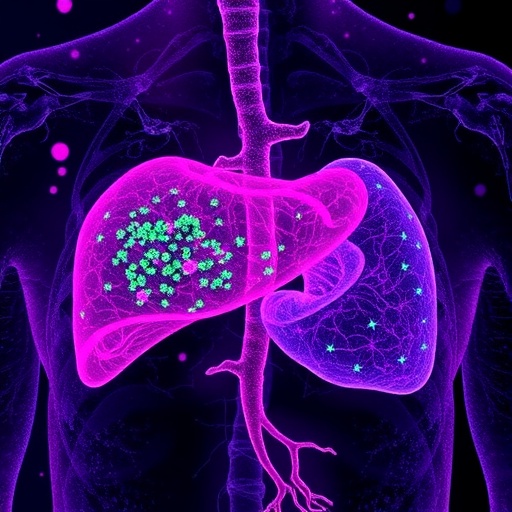Since receiving FDA approval in late 2023, histotripsy—a groundbreaking non-invasive ultrasound-based therapy designed to target and destroy liver tumors—has rapidly gained traction at the University of Michigan Health system, with clinical applications commencing in early 2024. This novel therapeutic technology harnesses focused ultrasound waves to mechanically fragment tumor tissues without relying on conventional methods such as chemotherapy or radiation, thereby markedly reducing the severe side effects often associated with those treatments. As histotripsy’s footprint expands throughout Michigan and neighboring states, researchers at the University of Michigan are diligently investigating the nuanced immunological responses that follow treatment, aiming to unlock further therapeutic potential.
Driven by these promising initial outcomes, a team led by assistant research scientist Anutosh Ganguly, Ph.D., extended their investigations to characterize how histotripsy impacts tumor immunology beyond primary liver cancers. Their recent work, published in Molecular Cancer Therapeutics, explores histotripsy’s potential in modulating immune responses in tumor types such as melanoma and pancreatic cancer—forms of malignancy that traditionally resist conventional treatments. By elucidating systemic immunomodulatory effects mediated by histotripsy, the team hopes to transform the therapeutic landscape for metastatic and refractory cancers.
.adsslot_Wue6YEsZfS{ width:728px !important; height:90px !important; }
@media (max-width:1199px) { .adsslot_Wue6YEsZfS{ width:468px !important; height:60px !important; } }
@media (max-width:767px) { .adsslot_Wue6YEsZfS{ width:320px !important; height:50px !important; } }
ADVERTISEMENT
Mechanistically, the reduction in tumor hypoxia triggers a cascade of immunological events, notably the recruitment and activation of CD8+ cytotoxic T lymphocytes (CTLs) at both the ablation zone and remote tumor niches. These T cells are critical effectors of adaptive immunity capable of identifying and destroying cancer cells. Ganguly’s team demonstrated that histotripsy not only physically debulks tumor burdens but also acts as an immunological adjuvant, stimulating the patient’s own immune system to mount systemic anti-cancer attacks. Such dual-action properties position histotripsy uniquely as both a local and systemic cancer therapy.
Increasingly, therapeutic strategies in oncology are focusing on the integration of tumor ablation with immune modulation. Histotripsy aligns perfectly with this paradigm, enhancing responsiveness to concurrent treatments such as chemotherapy, radiation, and emerging immunotherapies. Ganguly underscores that leveraging the immune activation induced by histotripsy could potentiate combination regimens, potentially overcoming resistance mechanisms that plague monotherapies. This synergy bears promise to improve clinical outcomes and reduce treatment-related toxicity.
Further illuminating histotripsy’s immunological impact, Ganguly and colleagues are probing its capacity to alter immune cell populations and cytokine profiles systemically, seeking biomarkers that predict response and guide personalized treatment planning. These efforts aim to identify how histotripsy reshapes the tumor microenvironment and remodeling immune landscapes to favor tumor eradication. Understanding these mechanisms is vital for optimizing treatment protocols and designing adjuvant therapies that capitalize on histotripsy’s immune-potentiating effects.
Histotripsy’s ability to mechanically liberate tumor-associated antigens, such as HER2 from breast cancer cells, is another exciting avenue of investigation. Tumor antigen release can prime dendritic cells and other antigen-presenting cells, kickstarting an adaptive immune response that goes beyond the treated lesion. Research shows that this antigen liberation coupled with hypoxia reversal can collectively enhance systemic anti-tumor immunity, preventing metastasis and improving long-term survival in patients.
The ongoing research also involves multidisciplinary collaboration among University of Michigan departments including Surgery, Biomedical Engineering, Immunology, and the VA Ann Arbor Healthcare System. Such concerted efforts pool expertise spanning tumor biology, immune mechanisms, engineering innovation, and clinical translation, creating a fertile environment for rapid therapeutic development. The diverse coalitions are refining histotripsy protocols, assessing safety profiles, and evaluating efficacy across various tumor models.
Of significant note, the research received partial support from HistoSonics and the Focused Ultrasound Foundation, alongside funding from NIH and the Department of Veterans Affairs. Intellectual property rights and potential conflicts have been appropriately managed and transparently disclosed, ensuring scientific integrity. As clinical experience with histotripsy grows, ongoing studies are designed to assess not only tumor control but also patient quality of life, immune memory formation, and long-term resistance patterns.
Looking forward, the team envisions a future in which histotripsy serves as a cornerstone technology in multimodal cancer therapy, enabling minimally invasive destruction of tumors while simultaneously priming the immune system for durable, systemic control. Its unique mode of action holds transformative potential in treating metastatic disease, reducing recurrence, and minimizing side effects that currently compromise patient wellbeing. Collaborative clinical trials and translational research will be critical in realizing histotripsy’s full promise.
This new frontier in cancer treatment, combining mechanical precision with immunological stimulation, embodies the convergence of engineering excellence and biological insight. Histotripsy could well signify a paradigm shift, moving beyond purely destructive approaches to therapies that empower the body’s inherent defenses. As data continues to emerge, the oncology community watches with anticipation for broader applications across cancer types and integration into personalized medicine frameworks.
Subject of Research:
Histotripsy-focused ultrasound treatment and its immunomodulatory effects in the treatment of melanoma, pancreatic cancers, and liver tumors.
Article Title:
Histotripsy-Focused Ultrasound Treatment Abrogates Tumor Hypoxia Responses and Stimulates Antitumor Immune Responses in Melanoma
News Publication Date:
8-Apr-2025
Web References:
https://doi.org/10.1158/1535-7163.MCT-24-0715
References:
Ganguly, A., Song, B., Karanam, C., et al. “Histotripsy-Focused Ultrasound Treatment Abrogates Tumor Hypoxia Responses and Stimulates Antitumor Immune Responses in Melanoma.” Molecular Cancer Therapeutics, April 2025.
Keywords:
Cancer treatments, Medical treatments, Immunomodulation, Focused ultrasound, Histotripsy, Tumor hypoxia, Antitumor immunity, Melanoma, Pancreatic cancer, Liver cancer, Tumor microenvironment
Tags: acoustic cavitation in cancer therapyadvanced tumor ablation techniquesFDA approval 2023focused ultrasound technologyhistotripsy cancer treatmentimmunological response to histotripsyliver tumor destructionmechanical tissue disruptionnon-invasive ultrasound therapyoutpatient cancer treatment optionsreducing chemotherapy side effectsUniversity of Michigan Health innovations





